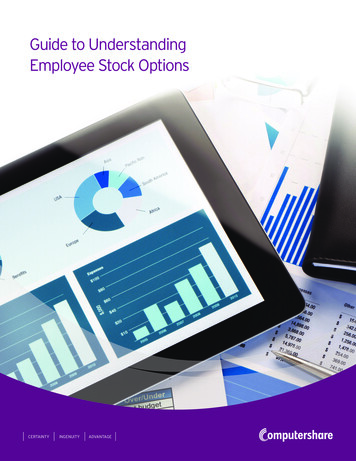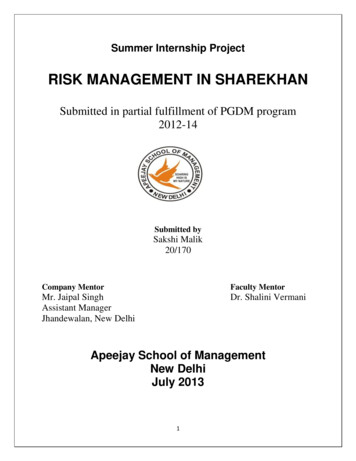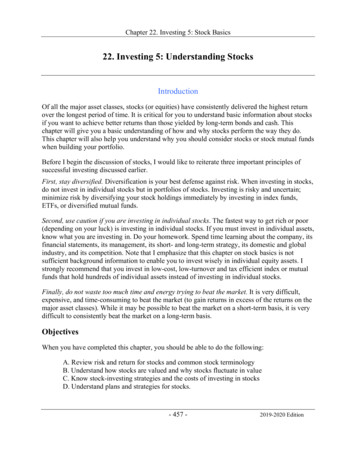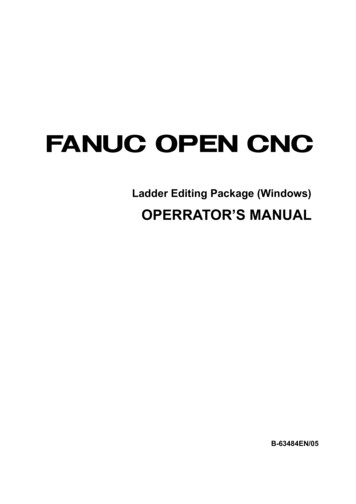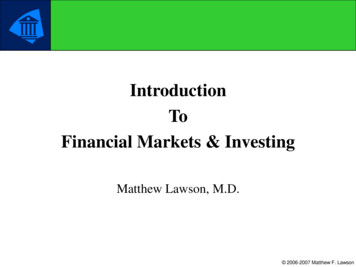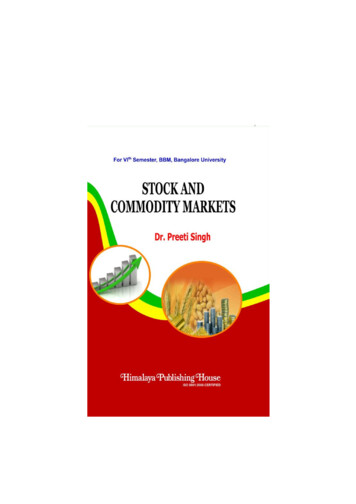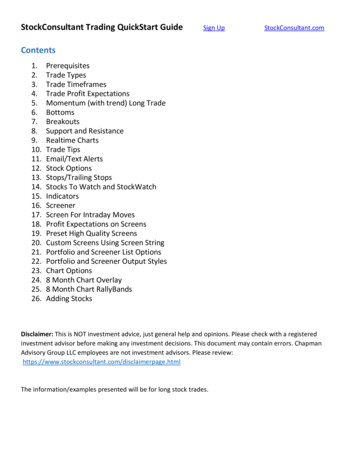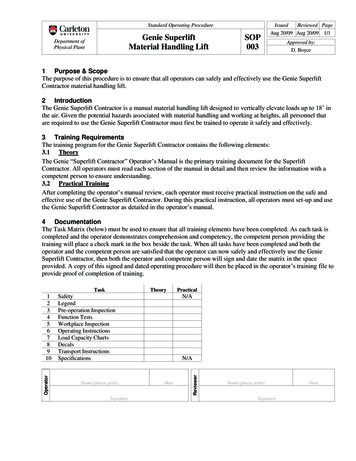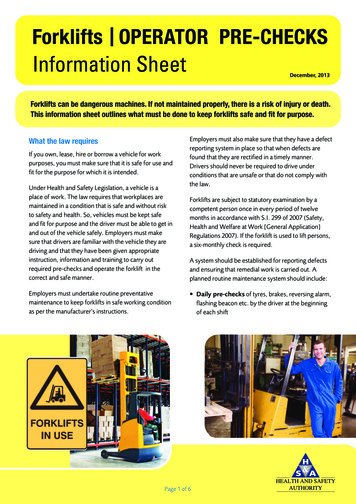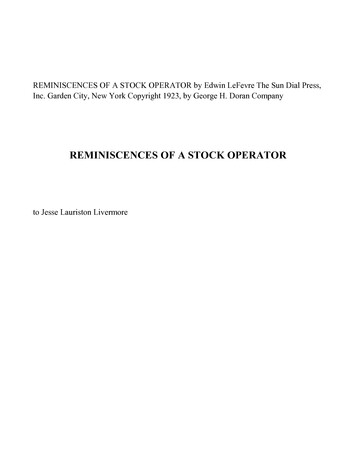
Transcription
REMINISCENCES OF A STOCK OPERATOR by Edwin LeFevre The Sun Dial Press,Inc. Garden City, New York Copyright 1923, by George H. Doran CompanyREMINISCENCES OF A STOCK OPERATORto Jesse Lauriston Livermore
Reminiscences of a Stock OperatorChapter II went to work when I was just out of grammar school. I got a job as quotation-boardboy in a stockbrokerage office. I was quick at figures. At school I did three years ofarithmetic in one. I was particularly good at mental arithmetic. As quotation-board boy Iposted the numbers on the big board in the customers' room. One of the customersusually sat by the ticker and called out the prices. They couldn't come too fast for me. Ihave always remembered figures. No trouble at all.There were plenty of other employees in that office. Of course I made friends with theother fellows, but the work I did, if the market was active, kept me too busy from tena.m. to three p.m. to let me do much talking. I don't care for it, anyhow, during businesshours.But a busy market did not keep me from thinking about the work. Those quotations didnot represent prices of stocks to me, so many dollars per share. They were numbers. Ofcourse, they meant something. They were always changing. It was all I had to beinterested in the changes. Why did they change? I didn't know. I didn't care. I didn'tthink about that. I simply saw that they changed. That was all I had to think about fivehours every day and two on Saturdays: that they were always changing.That is how I first came to be interested in the behaviour of prices. I had a very goodmemory for figures. I could remember in detail how the prices had acted on the previousday, just before they went up or down. My fondness for mental arithmetic came in veryhandy.I noticed that in advances as well as declines, stock prices were apt to show certainhabits, so to speak. There was no end of parallel cases and these made precedents toguide me. I was only fourteen, but after I had taken hundreds of observations in my-1-
Reminiscences of a Stock Operatormind I found myself testing their accuracy, comparing the behaviour of stocks to-daywith other days. It was not long before I was anticipating movements in prices. My onlyguide, as I say, was their past performances. I carried the "dope sheets" in my mind. Ilooked for stock prices to run on form. I had "clocked" them. You know what I mean.You can spot, for instance, where the buying is only a trifle better than the selling. Abattle goes on in the stock market and the tape is your telescope. You can depend upon itseven out of ten cases.Another lesson I learned early is that there is nothing new in Wall Street. There can't bebecause speculation is as old as the hills. Whatever happens in the stock market to-dayhas happened before and will happen again. I've never forgotten that. I suppose I reallymanage to remember when and how it happened. The fact that I remember that way ismy way of capitalizing experience.I got so interested in my game and so anxious to anticipate advances and declines in allthe active stocks that I got a little book. I put down my observations in it. It was not arecord of imaginary transactions such as so many people keep merely to make or losemillions of dollars without getting the swelled head or going to the poorhouse. It wasrather a sort of record of my hits and misses, and next to the determination of probablemovements I was most interested in verifying whether I had observed accurately; inother words, whether I was right.Say that after studying every fluctuation of the day in an active stock I would concludethat it was behaving as it always did before it broke eight or ten points. Well, I would jotdown the stock and the price on Monday, and remembering past performances I wouldwrite down what it ought to do on Tuesday and Wednesday. Later I would check upwith actual transcriptions from the tape.That is how I first came to take an interest in the message of the tape. The fluctuationswere from the first associated in my mind with upward or downward movements. Ofcourse there is always a reason for fluctuations, but the tape does not concern itself withthe why and wherefore. It doesn't go into explanations. I didn't ask the tape why when Iwas fourteen, and I don't ask it to-day, at forty. The reason for what a certain stock doesto-day may not be known for two or three days, or weeks, or months. But what thedickens does that matter? Your business with the tape is now not tomorrow. The reasoncan wait. But you must act instantly or be left. Time and again I see this happen. You'll-2-
Reminiscences of a Stock Operatorremember that Hollow Tube went down three points the other day while the rest of themarket rallied sharply. That was the fact. On the following Monday you saw that thedirectors passed the dividend. That was the reason. They knew what they were going todo, and even if they didn't sell the stock themselves they at least didn't buy it There wasno inside buying; no reason why it should not break.Well, I kept up my little memorandum book perhaps six months. Instead of leaving forhome the moment I was through with my work, I'd jot down the figures I wanted andwould study the changes, always looking for the repetitions and parallelisms ofbehaviour learning to read the tape, although I was not aware of it at the time.One day one of the office boys he was older than I came to me where I was eating mylunch and asked me on the quiet if I had any money."Why do you want to know?" I said."Well," he said, "I've got a dandy tip on Burlington. I'm going to play it if I can getsomebody to go in with me.""How do you mean, play it?" I asked. To me the only people who played or could playtips were the customers old jiggers with oodles of dough. Why, it cost hundreds, eventhousands of dollars, to get into the game. It was like owning your private carriage andhaving a coachman who wore a silk hat."That's what I mean; play it!" he said."How much you got?""How much you need?""Well, I can trade in five shares by putting up 5.""How are you going to play it?""I'm going to buy all the Burlington the bucket shop will let me carry with the money Igive him for margin," he said. "It's going up sure. It's like picking up money. We'lldouble ours in a jiffy."-3-
Reminiscences of a Stock Operator"Hold on!" I said to him, and pulled out my little dope book.I wasn't interested in doubling my money, but in his saying that Burlington was goingup. If it was, my note-book ought to show it. I looked. Sure enough, Burlington,according to my figuring, was acting as it usually did before it went up. I had neverbought or sold anything in my life, and I never gambled with the other boys. But all Icould see was that this was a grand chance to test the accuracy of my work, of myhobby. It struck me at once that if my dope didn't work in practice there was nothing inthe theory of it to interest anybody. So I gave him all I had, and with our pooledresources he went to one of the nearby bucket shops and bought some Burlington. Twodays later we cashed in. I made a profit of 3.12.After that first trade, I got to speculating on my own hook in the bucket shops. I'd goduring my lunch hour and buy or sell it never made any difference to me. I was playinga system and not a favorite stock or backing opinions. All I knew was the arithmetic ofit. As a matter of fact, mine was the ideal way to operate in a bucket shop, where all thata trader does is to bet on fluctuations as they are printed by the ticker on the tape.It was not long before I was taking much more money out of the bucket shops than I waspulling down from my job in the brokerage office. So I gave up my position. My folksobjected, but they couldn't say much when they saw what I was making. I was only a kidand office-boy wages were not very high. I did mighty well on my own hook.I was fifteen when I had my first thousand and laid the cash in front of my mother allmade in the bucket shops in a few months, besides what I had taken home. My mothercarried on something awful. She wanted me to put it away in the savings bank out ofreach of temptation. She said it was more money than she ever heard any boy of fifteenhad made, starting with nothing. She didn't quite believe it was real money. She used toworry and fret about it. But I didn't think of anything except that I could keep on provingmy figuring was right. That's all the fun there is being right by using your head. If I wasright when I tested my convictions with ten shares I would be ten times more right if Itraded in a hundred shares. That is all that having more margin meant to me I was rightmore emphatically. More courage? No! No difference! If all I have is ten dollars and Irisk it, I am much braver than when I risk a million, if I have another million saltedaway.Anyhow, at fifteen I was making a good living out of the stock market. I began in the-4-
Reminiscences of a Stock Operatorsmaller bucket shops, where the man who traded in twenty shares at a clip was suspectedof being John W. Gates in disguise or J. P. Morgan traveling incognito. Bucket shops inthose days seldom lay down on their customers. They didn't have to. There were otherways of parting customers from their money, even when they guessed right. Thebusiness was tremendously profitable. When it was conducted legitimately I meanstraight, as far as the bucket shop went the fluctuations took care of the shoestrings. Itdoesn't take much of a reaction to wipe out a margin of only three quarters of a point.Also, no welsher could ever get back in the game. Wouldn't have any trade.I didn't have a following. I kept my business to myself. It' was a one-man business,anyhow. It was my head, wasn't it? Prices either were going the way I doped them out,without any help from friends or partners, or they were going the other way, and nobodycould stop them out of kindness to me. I couldn't see where I needed to tell my businessto anybody else. I've got friends, of course, but my business has always been the same aone-man affair. That is why I have always Played a lone hand.As it was, it didn't take long for the bucket shops to get sore on me for beating them. I'dwalk in and plank down my margin, but they'd look at it without making a move to grabit. They'd tell me there was nothing doing. That was the time they got to calling me theBoy Plunger. I had to be changing brokers all the time, going from one bucket shop toanother. It got so that I had to give a fictitious name. I'd begin light, only fifteen ortwenty shares. At times, when they got suspicious, I'd lose on purpose at first and thensting them proper. Of course after a little while they'd find me too expensive and they'dtell me to take myself and my business elsewhere and not interfere with the owners'dividends.Once, when the big concern I'd been trading with for months shut down on me I madeup my mind to take a little more of their money away from them. That bucket shop hadbranches all over the city, in hotel lobbies, and in near-by towns. I went to one of thehotel branches and asked the manager a few questions and finally got to trading. But assoon as I played an active stock my especial way he began to get messages from thehead office asking who it was that was operating. The manager told me what they askedhim and I told him my name was Edward Robinson, of Cambridge. He telephoned theglad news to the big chief. But the other end wanted to know what I looked like. Whenthe manager told me that I said to him, "Tell him I am a short fat man with dark hair anda bushy beard!" But he described me instead, and then he listened and his face got red-5-
Reminiscences of a Stock Operatorand he hung up and told me to beat it."What did they say to you?" I asked him politely."They said, 'You blankety-blank fool, didn't we tell you to take no business from LarryLivingston? And you deliberately let him trim us out of 700!'' He didn't say what elsethey told him.I tried the other branches one after another, but they all got to know me, and my moneywasn't any good in any of their offices. I couldn't even go in to look at the quotationswithout some of the clerks making cracks at me. I tried to get them to let me trade atlong intervals by dividing my visits among them all. But that didn't work.Finally there was only one left to me and that was the biggest and richest of all theCosmopolitan Stock Brokerage Company.The Cosmopolitan was rated as A-1 and did an enormous business. It had branches inevery manufacturing town in New England. They took my trading all right, and I boughtand sold stocks and made and lost money for months, but in the end it happened withthem as usual. They didn't refuse my business point-blank, as the small concerns had.Oh, not because it wasn't sportsmanship, but because they knew it would give them ablack eye to publish the news that they wouldn't take a fellow's business just becausethat fellow happened to make a little money. But they did the next worse thing that is,they made me put up a three-point margin and compelled me to pay a premium at first ofa half point, then a point, and finally, a point and a half. Some handicap, that! How?Easy! Suppose Steel was selling at 90 and you bought it. Your ticket read, normally:"Bot ten Steel at 90-1/8." If you put up a point margin it meant that if it broke 89-1/4you were wiped out automatically. In a bucket shop the customer is not importuned formore margin or put to the painful necessity of telling his broker to sell for anything hecan get.But when the Cosmopolitan tacked on that premium they were hitting below the belt. Itmeant that if the price was 90 when I bought, instead of making my ticket: "Bot Steel at90-l/8," it read: "Bot Steel at 91-1/8." Why, that stock could advance a point and aquarter after I bought it and I'd still be losing money if I closed the trade. And by alsoinsisting that I put up a three-point margin at the very start they reduced my tradingcapacity by two thirds. Still, that was the only bucket shop that would take my business-6-
Reminiscences of a Stock Operatorat all, and I had to accept their terms or quit trading.Of course I had my ups and downs, but was a winner on balance. However, theCosmopolitan people were not satisfied with the awful handicap they had tacked on me,which should have been enough to beat anybody. They tried to double-cross me. Theydidn't get me. I escaped because of one of my hunches.The Cosmopolitan, as I said, was my last resort. It was the richest bucket shop in NewEngland, and as a rule they put no limit on a trade. I think I was the heaviest individualtrader they had that is, of the steady, every-day customers. They had a fine office and thelargest and completest quotation board I have ever seen anywhere. It ran along thewhole length of the big room and every imaginable thing was quoted. I mean stocksdealt in on the New York and Boston Stock Exchanges, cotton, wheat, provisions,metals everything that was bought and sold in New York, Chicago, Boston andLiverpool.You know how they traded in bucket shops. You gave your money to a clerk and toldhim what you wished to buy or sell. He looked at the tape or the quotation board andtook the price from there the last one, of course. He also put down the time on the ticketso that it almost read like a regular broker's report that is, that they had bought or soldfor you so many shares of such a stock at such a price at such a time on such a day andhow much money they received from you. When you wished to close your trade youwent to the clerk the same or another, it depended on the shop and you told him. He tookthe last price or if the stock had not been active he waited for the next quotation thatcame out on the tape. He wrote that price and the time on your ticket, O.K.'d it and gaveit back to you, and then you went to the cashier and got whatever cash it called for. Ofcourse, when the market went against you and the price went beyond the limit set byyour margin, your trade automatically closed itself and your ticket became one morescrap of paper.In the humbler bucket shops, where people were allowed to trade in as little as fiveshares, the tickets were little slips different colors for buying and selling and at times, asfor instance in boiling bull markets, the shops would be hard hit because all thecustomers were bulls and happened to be right. Then the bucket shop would deduct bothbuying and selling commissions and if you bought a stock at 20 the ticket would read20-1/4. You thus had only 3/4 of a point's run for your money.-7-
Reminiscences of a Stock OperatorBut the Cosmopolitan was the finest in New England. It had thousands of patrons and Ireally think I was the only man they were afraid of. Neither the killing premium nor thethree-point margin they made me put up reduced my trading much. I kept on buying andselling as much as they'd let me. I sometimes had a line of 5000 shares.Well, on the day the thing happened that I am going to tell you, I was short thirty-fivehundred shares of Sugar. I had seven big pink tickets for five hundred shares each. TheCosmopolitan used big slips with a blank space on them where they could write downadditional margin. Of course, the -bucket shops never ask for more margin. The thinnerthe shoestring the better for them, for their profit lies in your being wiped. In the smallershops if you wanted to margin your trade still further they'd make out a new ticket, sothey could charge you the buying commission and only give you a run of 3/4 of a pointon each point's decline, for they figured the selling commission also exactly as if it werea new trade.Well, this day I remember I had up over 10,000 in margins.I was only twenty when I first accumulated ten thousand dollars in cash. And you oughtto have heard my mother. You'd have thought that ten thousand dollars in cash was morethan anybody carried around except old John D., and she used to tell me to be satisfiedand go into some regular business. I had a hard time convincing her that I was notgambling, but making money by figuring. But all she could see was that ten thousanddollars was a lot of money and all I could see was more margin.I had put out my 3509 shares of Sugar at 105-1/4. There was another fellow in the room,Henry Williams, who was short 2500 shares. I used to sit by the ticker and call out thequotations for the board boy. The price behaved as I thought it would. It promptly wentdown a couple of points and paused a little to get its breath before taking another dip.The general market was pretty soft and everything looked promising. Then all of asudden I didn't like the way Sugar was doing its hesitating. I began to feeluncomfortable. I thought I ought to get out of the market. Then it sold at 103 that waslow for the day but instead of feeling more confident I felt more uncertain. I knewsomething was wrong somewhere, but I couldn't spot it exactly. But if something wascoming and I didn't know where from, I couldn't be on my guard against it. That beingthe case I'd better be out of the market.You know, I don't do things blindly. I don't like to. I never did. Even as a kid I had to-8-
Reminiscences of a Stock Operatorknow why I should do certain things. But this time I had no definite reason to give tomyself, and yet I was so uncomfortable that I couldn't stand it. I called to a fellow Iknew, Dave Wyman, and said to him : "Dave, you take my place here. I want you to dosomething for me. Wait a little before you call out the next price of Sugar, will you?"He said he would, and I got up and gave him my place by the ticker so he could call outthe prices for the boy. I took my seven Sugar tickets out of my pocket and walked overto the counter, to where the clerk was who marked the tickets when you closed yourtrades. But I didn't really know why I should get out of the market, so I just stood there,leaning against the counter, my tickets in my hand so that the clerk couldn't see them.Pretty soon I heard the clicking of a telegraph instrument and I saw Tom Burnham, theclerk, turn his head quickly and listen. Then I felt that something crooked was hatching,and I decided not to wait any longer. Just then Dave Wyman by the ticker, began: "Su-"and quick as a flash I slapped my tickets on the counter in front of the clerk and yelled,"Close Sugar!" before Dave had finished calling the price. So, of course, the house hadto close my Sugar at the last quotation. What Dave called turned out to be 103 again.According to my dope Sugar should have broken 103 by now. The engine wasn't hittingright. I had the feeling that there was a trap in the neighborhood. At all events, thetelegraph instrument was now going like mad and I noticed that Tom Burnham, theclerk, had left my tickets unmarked where I laid them, and was listening to the clickingas if he were waiting for something. So I yelled at him: "Hey, Tom, what in hell are youwaiting for? Mark the price on these tickets 103! Get a gait on!"Everybody in the room heard me and began to look toward us and ask what was thetrouble, for, you see, while the Cosmopolitan had never laid down, there was no telling,and a run on a bucket shop can start like a run on a bank. If one customer gets suspiciousthe others follow suit. So Tom looked sulky, but came over and marked my tickets"Closed at 103" and shoved the seven of them over toward me. He sure had a sour face.Say, the distance from Tom's place to the cashier's cage "wasn't over eight feet. But Ihadn't got to the cashier to get my money when Dave Wyman by the ticker yelledexcitedly: "Gosh! Sugar, 108!" But it was too late; so I just laughed and called over toTom, "It didn't work that time, did it, old boy?"Of course, it was a put-up job. Henry Williams and I together were short six thousandshares of Sugar. That bucket shop had my margin and Henry's, and there may have been-9-
Reminiscences of a Stock Operatora lot of other Sugar shorts in the office; possibly eight or ten thousand shares in all.Suppose they had 20,000 in Sugar margins. That was enough to pay the shop tothimblerig the market on the New York Stock Exchange and wipe us out. In the old dayswhenever a bucket shop found itself loaded with too many bulls on a certain stock it wasa common practice to get some broker to wash down the price of that particular stock farenough to wipe out all the customers that were long of it. This seldom cost the bucketshop more than a couple of points on a few hundred shares, and they made thousands ofdollars.That was what the Cosmopolitan did to get me and Henry Williams and the other Sugarshorts. Their brokers in New York ran up the price to 108. Of course it fell right back,but Henry and a lot of others were wiped out. Whenever there was an unexplained sharpdrop which was followed by instant recovery, the newspapers in those days used to callit a bucket-shop drive.And the funniest thing was that not later than ten days after the Cosmopolitan peopletried to double-cross me a New York operator did them out of over seventy thousanddollars. This man, who was quite a market factor in his day and a member of the NewYork Stock Exchange, made a great name for himself as a bear during the Bryan panicof '96. He was forever running up against Stock Exchange rules that kept him fromcarrying out some of his plans at the expense of his fellow members. One day he figuredthat there would be no complaints from either the Exchange or the police authorities ifhe took from the bucket shops of the land some of their ill-gotten gains. In the instance Ispeak of he sent thirty-five men to act as customers. They went to the main office and tothe bigger branches. On a certain day at a fixed hour the agents all bought as much of acertain stock as the managers would let them. They had instructions to sneak out at acertain profit. Of course what he did was to distribute bull tips on that stock among hiscronies and then he went in to the floor of the Stock Exchange and bid up the price,helped by the room traders, who thought he was a good sport Being careful to pick outthe right stock for that work, there was no trouble in putting up the price three or fourpoints. His agents at the bucket shops cashed in as prearranged.A fellow told me the originator cleaned up seventy thousand dollars net, and his agentsmade their expenses and then pay besides. He played that game several times all overthe country, punishing the bigger bucket shops of New York, Boston, Philadelphia,Chicago, Cincinnati and St. Louis. One of his favorite stocks was Western Union,- 10 -
Reminiscences of a Stock Operatorbecause it was so easy to move a semi active stock like that a few points up en-down.His agents bought it at a certain figure, sold at two points profit, went short and tookthree points more. By the way, I read the other day that that man died, poor and obscure.If he had died in 1896 he would have got at least a column on the first page of everyNew York paper. As it was he got two lines on the fifth.- 11 -
Reminiscences of a Stock OperatorChapter IIBetween the discovery that the Cosmopolitan Stock Brokerage Company was ready tobeat me by foul means if the killing handicap of a three-point margin and a point-and-ahalf premium didn't do it, and hints that they didn't want my business anyhow, I soonmade up my mind to go to New York, where I could trade in the office of some memberof the New York Stock Exchange. I didn't want any Boston branch, where the quotationshad to be telegraphed. I wanted to be close to the original source. I came to New York atthe age of 21, bringing with me all I had, twenty-five hundred dollars.I told you I had ten thousand dollars when I was twenty, and my margin on that Sugardeal was over ten thousand. But I didn't always win. My plan of trading was soundenough and won oftener than it lost. If I had stuck to it I'd have been right perhaps asoften as seven out of ten times. In fact, I always made money when I was sure I wasright before I began. What beat me was not having brains enough to stick to my owngame that is, to play the market only when I was satisfied that precedents favored myplay. There is a time for all things, but I didn't know it. And that is precisely what beatsso many men in Wall Street who are very far from being in the main sucker class. Thereis the plain fool, who does the wrong thing at all times everywhere, but there is the WallStreet fool, who thinks he must trade all the time. No man can always have adequatereasons for buying or selling stocks daily or sufficient knowledge to make his play anintelligent play.I proved it Whenever I read the tape by the light of experience I made money, but whenI made a plain fool play I had to lose. I was no exception, was I? There was the hugequotation board staring me in the face, and the ticker going on, and people trading andwatching their tickets turn" into cash or into waste paper. Of course I let the craving forexcitement get the better of my judgment. In a bucket shop where your margin is ashoestring you don't play for long pulls. You are wiped too easily and quickly. The- 12 -
Reminiscences of a Stock Operatordesire for constant action irrespective of underlying conditions is responsible for manylosses in Wall Street even among the professionals, who feel that they must take homesome money every day, as though they were working for regular wages. I was only akid, remember. I did not know then what I learned later, what made me fifteen yearslater, wait two long weeks and see a stock on which I was very bullish go up thirtypoints before I felt that it was safe to buy it. I was broke and was trying to get back, andI couldn't afford to play recklessly. I had to be right, and so I waited. That was in 1915.It's a long story. I'll tell it later in its proper place. Now let's go on from where after yearsof practice at beating them I let the bucket shops take away most of my winnings.And with my eyes wide open, to boot! And it wasn't the only period of my life when Idid it, either. A stock operator has to fight a lot of expensive enemies within himself.Anyhow, I came to New York with twenty-five hundred dollars. There were no bucketshops here that a fellow could trust. The Stock Exchange and the police between themhad succeeded in closing them up pretty tight. Besides, I wanted to find a place wherethe only limit to my trading would be the size of my stake. I didn't have much of one,but I didn't expect it to stay little forever. The main thing at the start was to find a placewhere I wouldn't have to worry about getting a square deal. So I went to a New YorkStock Exchange house that had a branch at home where I knew some of the clerks. Theyhave long since gone out of business. I wasn't there long, didn't like one of the partners,and then I went to A. R. Fullerton & Co. Somebody must have told them about my earlyexperiences, because it was not long before they all got to calling me the Boy Trader.I've always looked young. It was a handicap in some ways but it compelled me to fightfor my own because so many tried to take advantage of my youth. The chaps at thebucket shops seeing what a kid I was, always thought I was a fool for luck and that thatwas the only reason why I beat them so often.Well, it wasn't six months before I was broke. I was a pretty active trader and had a sortof reputation as a winner. I guess my commissions amounted to something. I ran up myaccount quite a little, but, of course, in the end I lost. I played carefully; but I had to lose.I'll tell you the reason: it was my remarkable success in the bucket shops!I could beat the game my way only in a bucket shop; where I was betting onfluctuations. My tape reading had to do with that exclusively. When I bought the pricewas there on the quotation board, right in front of me. Even before I bought I knewexactly the price I'd have to pay for my stock. And I always could sell on t
Reminiscences of a Stock Operator smaller bucket shops, where the man who traded in twenty s
